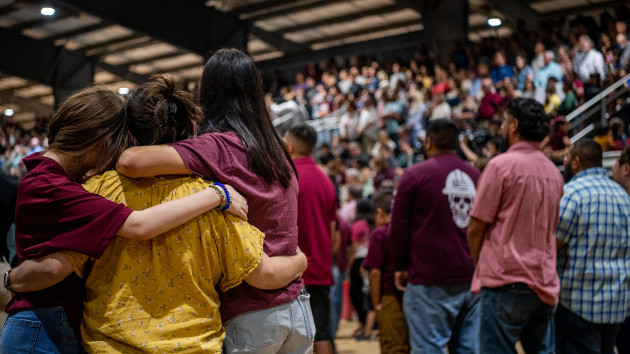(UVALDE, Texas) — The cries of parents learning that their children had been killed in a mass shooting at an elementary school in Uvalde, Texas, reverberated from a local civic center late into the night on Tuesday.
At least 19 children and two teachers are dead after the shooting. Several more were injured.
The shooting has opened fresh wounds across a nation still grieving from the mass shooting in Buffalo, New York, just 10 days earlier. For Latinos in Texas, the grief cuts deeper.
In August, it will be the three-year anniversary of the mass shooting shooting in El Paso, where 23 people were gunned down — the majority of them Latinos — by an alleged white supremacist. It’s regarded as the deadliest attack on Latinos in modern U.S. history.
Robb Elementary School, where this most recent school shooting occurred, has a student population that is 90% Hispanic.
Latinos in Texas are grieving as the trauma of gun violence in or against this community compounds, while the nation continues its fiery political debate about guns, gun violence and how to bring justice to those killed in only the most recent mass shooting.
“I’m emotionally going from sadness to anger,” said Rodolfo Rosales, Jr., the Texas state director of the civil rights organization League of United Latin American Citizens.
“I can actually feel my emotions shifting as I speak to you because of the fact that I don’t understand the lack of action,” he said. “I don’t understand. Why there are children dead today in an elementary school, I don’t get it.”
Hispanics are disproportionately affected by firearms violence in the United States, according to the research organization Violence Policy Center.
Nearly 70,000 Hispanics were killed by guns between 1999 and 2019, the organization found, including 44,614 gun homicide victims and 21,466 gun suicides.
Juan Ortiz, who lives in El Paso and runs a mutual aid service called Casa Carmelita near the border, told ABC News he’s grappling with the pain of continuing to see people from his community being killed in these types of tragedies.
“The psychological toll that it’s taking, you can feel it,” Ortiz said. “And I think the rest of the nation should feel it as well.”
Texas, where Hispanic people make up almost 40% of the population, has seen mass shootings become painfully common, with several high-profile tragedies in recent years. Among them: a drive-by shooting spree that killed seven in Odessa and Midland in 2019, and the massacre of 26 at a church in Sutherland Springs in 2017.
Ortiz said people have even shown up with guns to counter-protest activists like himself. Ortiz was a victim of gun violence in the 1990s, and he said the recent shootings and events have made him feel emotionally numb as he rehashes old pain.
“The problems and fixes just seem so massive that most people don’t even know where to start,” he said. “Everyone’s in mourning. Things feel really heavy.”
Ortiz said his work as an activist is getting harder with each new tragedy, as people become “over-extended and tired and traumatized.” It has taken a toll on many, he said.
Fred Sandoval, the executive director of the National Latino Behavioral Health Association, says that repeated violence targeting Latinos is likely to impact the mental health and wellbeing of those grieving the continued loss of community members.
He said the shock from the incident may stun people into shutting down — an act that he urges against.
He said stress and trauma can lead to many different symptoms — including lack of sleep, loss of appetite, forgetfulness and confusion — which could impact one’s health in the long term if left unaddressed. Daily routines and lives are disrupted by such incidents — a disruption that may grow larger with each new one, he said.
Salvador said that now is the time for people to band together. Latinos, he said, often have a communal spirit and he saw the power of community support following the El Paso shooting.
Sandoval said local efforts to respond to mental health needs and to provide mutual aid support during the aftermath of the incident should set an example for how Uvalde should move forward.
Culturally-competent mental health resources are important for communities with language barriers and stigma against mental illness, he said.
“Everybody else in the school, all your neighbors, live in this community. They’re all very tightly knit together, right? Everybody knows each other or knows the family,” Sandoval said.
He continued, “[They need to have] a local community response that’s aided by allies and practitioners who look like them, talk like them, speak like them, and are able to help them learn coping mechanisms and learn how to be able to process what they’re experiencing.”
Avoiding isolation and receiving or reaching out for help — professional or not — are important tools for coping with grief, he said. Sandoval urges neighbors and community members to check on one another.
In the face of adversity, Salvador said, Latino communities have looked out for one another and he hopes Uvalde does the same as it attempts to heal and move forward from this latest devastation.
“[El Paso] did an incredible job dealing with that communal loss,” Salvador said. “That loss has still scarred their life experience. It’s still there. It didn’t go away. But it just simply means that people at least didn’t get left behind, given the emotional impact.”
Copyright © 2022, ABC Audio. All rights reserved.












